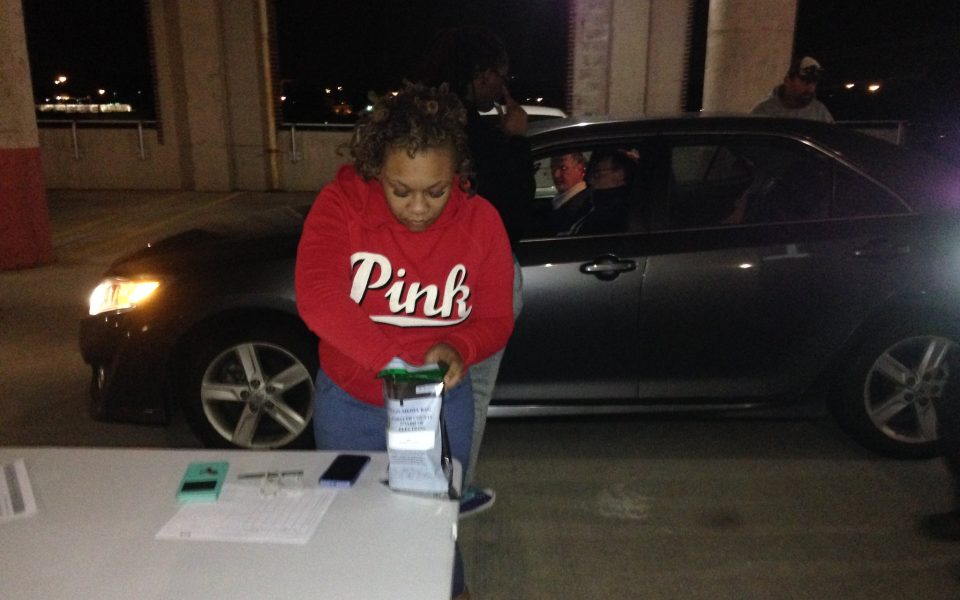The status quo held in local races for Winston-Salem City Council and Forsyth County Commission, respectively controlled by urban Democrats and suburban Republicans in a topsy-turvy election that saw Latino voters surging against Trump along with some Republicans, and an unexpected reservoir of support for the Republican nominee among independents.
The bitterly divided contest for North Carolina’s political soul saw two Winston-Salem Republicans boosted to council of state seats, with former state lawmaker Dale Folwell prevailing over Democrat Dan Blue III by about 6 points, in the battle for open post of state treasurer, and Winston-Salem/Forsyth School Board member Mark Johnson appearing to oust incumbent Democrat June Atkinson from the position state superintendent by 2 points.
Folwell watched the results with fellow Republicans at the Forsyth County Country Club.
“I feel like our message has been to attack problems, not people,” he said. “People were stunned to learn that we’re paying $6 million to a Wall Street firm, and that the teachers and state troopers could not afford premiums. I’m excited about taking my skills to Raleigh to tackle that.”
With turnout amplified compared to the previous presidential election in 2012, Forsyth County’s contribution to the state’s pool of electoral votes, which went to Trump, remained virtually unchanged, with about 53 percent of the county’s voters favoring Clinton and about 42 percent supporting Trump.
Conforming to pattern across the state, turnout among unaffiliated voters leapt in Forsyth County. Many of them broke for Trump, however reluctantly.
“I didn’t like either candidate,” said Stephanie Fabrikant, who voted at the Glenn High School polling place in Kernersville. “I think we could take four years of [Trump]. Hillary Clinton, giving her a promotion from secretary of state — I can’t imagine doing that. Take a situation like Libya that resulted in the deaths of four Americans: She lied and refused to take responsibility. People say Donald Trump is a loose cannon, but look at the situation with her private server: It shows she has no idea about national security and preventing cyberattacks.”
While Trump made up ground with unaffiliated voters, some Forsyth County Republicans defected from their nominee.
David Hassen, who also voted at Glenn High School, chose Libertarian Gary Johnson for president, while selecting Sen. Richard Burr, Gov. Pat McCrory and other Republicans through the rest of his ballot.
“In my opinion, he’s not qualified whatsoever,” Hassen said. “There’s a certain weight that the office carries, and he doesn’t have what it takes.”
An activated Latino vote, particularly among young people, was also evident in Forsyth as a backlash against Trump.
Jennifer Loya, an 18-year-old graduate of Parkland High School, cast her first vote in a presidential contest at the Trinity Moravian Church polling place in Winston-Salem’s Southside neighborhood.
“I think we as human beings — we have rights,” she said. “I want people to live. We came over here to have a better life. I’m Hispanic. My vote counts.”
Forsyth County voters overwhelmingly favored three bonds. Voters favored a ballot initiative to raise $350 million for public school construction, roughly three to one. The funds will pay for new, suburban schools in the Smith Farm area and on Robinhood Road, along with the replacement of Brunson Elementary, Konnoak Elementary and Lowrance Middle/Paisley IB Magnet. The Koch Brothers-based Americans for Prosperity mobilized conservative voters against the bond, while a coalition of urban community leaders that included the Winston-Salem NAACP refrained from actively promoting the bond because of disappointment that it did not include funds for a new middle school on the east side of Winston-Salem.
Voters also approved a $65 million bond for a new “learning commons” with “technology-rich design and maker spaces” on the Main Campus of Forsyth Tech, a new aviation center at Smith Reynolds Airport, and an expansion of the transportation center to support automotive technology, diesel and heavy equipment, motorcycle service and racecar technology programs. A separate bond for $15 million will pay for improvements to Tanglewood, Triad Park and Horizons Park.
Democrats swept city council races, maintaining an 8-1 majority. In the two contested races, Democrats Jeff MacIntosh and John Larson prevailed over their Republican opponents, each with roughly two thirds of the vote. Mayor Allen Joines ran unopposed, along with fellow Democrats on city council Derwin Montgomery, Vivian Burke, James Taylor, Denise D. Adams and Dan Besse, along with lone Republican Robert Clark.
The Forsyth County Register of Deeds race went to Democrat Lynne Johnson, who unseated incumbent Norman Holleman in the primary. Johnson, who previously worked in the office for 27 years, prevailed over Republican Steve Woods, a former lawmaker.
As expected, Republican Virginia Foxx easily won a new term as representative of the 5th Congressional District, winning by 17 points. Republican Debra Conrad also easily fended off a challenge from Democratic challenger Marilynn Baker.
Republican incumbents also held on to the three seats in Forsyth County Commission District B. Democrat Selester Stewart, who placed a distant fourth, vowed to run again.
“Even if I don’t win county commission, I won a lot of hearts,” he said during the final stretch of campaigning outside the Griffith Fire Station polling place. “I’m gonna come back. I’m gonna give people another chance to vote for me.”
The vast majority of state lawmakers in the Forsyth County delegation, including Democrats Sen. Paul Lowe Jr., Rep. Evelyn Terry and Rep. Ed Hanes Jr., and Republicans Sen. Joyce Krawiec, Rep. Donna Lambeth and Rep. Julia Howard sailed to victory without opposition.
Join the First Amendment Society, a membership that goes directly to funding TCB‘s newsroom.
We believe that reporting can save the world.
The TCB First Amendment Society recognizes the vital role of a free, unfettered press with a bundling of local experiences designed to build community, and unique engagements with our newsroom that will help you understand, and shape, local journalism’s critical role in uplifting the people in our cities.
All revenue goes directly into the newsroom as reporters’ salaries and freelance commissions.


Leave a Reply